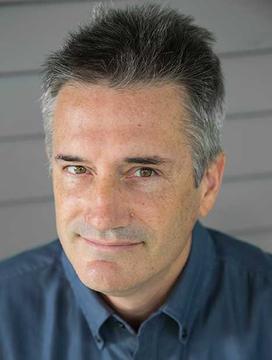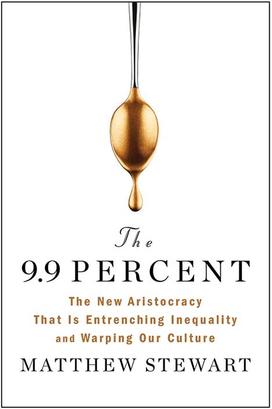Reading Room: Matthew Stewart ’85 Is Calling Out the 9.9 Percent
‘Rising inequality has corrupted some of the essential ideals of America’s middle class,’ Stewart says

What inspired the book?
Two fundamental sources: I was looking at the philosophical origins of the struggle over slavery, and I began to see the issue as driven much more by economic conflict than I think is widely understood. I saw economic conflict leading to class stratification and dynamics that just seemed so resonant with now. The other factor was the experience of being a member of the upper-middle-class meritocracy with kids, and the kind of madness that that involves.
What’s your basic argument?
Rising inequality has corrupted some of the essential ideals of America’s middle class. It has taken what I think is a sensible, good, and, in some ways, revolutionary project to build a society that’s fair, open, transparent, where everyone’s judged on merit, and turned it into something that’s more like its opposite.
Why focus on the 9.9 percent?
A lot of us are sliding in and out of a middle group that is much more complicit than we’re willing to acknowledge. We talk about Jeff Bezos [’86] and Elon Musk all day long. But there is this group below that, which even if it isn’t increasing its relative share [of the economic pie], it’s holding on. That makes it very distinct from the bottom 90 percent that is falling behind.

Meritocracy means that we allocate power in our society through open, transparent, and rational standards. The merit myth is, in essence, that everybody in our society gets what they deserve according to their individual merit, and our economic product is nothing but the sum of a bunch of individual merits. And that is wrong, it’s false, and it’s dangerous.
You see rising inequality at the root of most, if not all, of our social ills.
I appreciate the world is complex. But I get frustrated with some of the commentary on this issue, because there’s a tendency to personalize our conflicts, to say, “The real problem is that the upper-middle class have become a bunch of latte sippers, and they no longer feel comfortable in the presence of the hicks from the backwoods. And if we would just sit down and learn to talk, everything would resolve itself.” And I find that infuriating, because rising economic inequality is the story here, and all [the talk] about blue and red, and latte sipping, beer swilling, and so on — those are mostly after-effects.
What might impel the 9.9 percent to renounce their privileges?
Look around: You can see that American society has produced a certain amount of wealth and well-being, but it’s got some really big problems. We had a coup attempt this year. We’ve had a significant amount of conflict. We’ve had an inability to deal as effectively as we should have with a pandemic. You will not be able to live in a world that can deal with those issues unless you address this fundamental issue of economic inequality.
The second incentive is, do the math about your kids: Their chances of achieving meritocratic success are not good, and they’re going down all the time — and that’s a direct function of rising economic inequality. You can spend your prime adult years racing to yoga-for-tots classes and Japanese language tutoring in order to game the odds ever so slightly in your child’s favor. Or you can try to work for a fairer society where there are other ways of having a happy life.
Has your research made you rethink anything about your own life?
Mainly, it’s made me go easier on the kids. I keep reminding them — and myself — that there are other forms of life out there. Maybe you don’t have to be a credential-hoarding professional to be happy. I like to think that this project has made me (and the kids) think more frequently about the fundamentals, like the purpose of an education and the basis of a good society.
Interview conducted and condensed by Julia M. Klein











2 Responses
Victoria Romney s’65
3 Years AgoSocioeconomic Inequality
Thanks to Matthew Stewart ’85 for the interesting and insightful interview on his book The 9.9 Percent (October 2021 issue). I appreciated his sensible and humane perspective. However, he unhelpfully fell into the red/blue divide when he casually referenced the January 6 protest at the Capitol by implication as a “coup attempt” while ignoring the summer protests of 2020–21 —potentially the best evidence for his arguments.
January 6 was a political protest gone wrong, generated by a perception of suspect election procedures in several states. The summer protests, in contrast, were socioeconomically based. These expressed a need-driven passion sufficient to trigger an extended season of violent unrest.
Mr. Stewart could have pointed to the summer protests as exhibit one on the frustrations and ultimately the dangers of resource inequality. He failed to support his advocacy with his own example when he chose a partisan snipe over the persuasive evidence available to him.
Donald W. Burnes ’63
4 Years AgoOn Addressing Inequality
As a 35-year practitioner, researcher, author, and advocate in the cultural morass known as homelessness, I was very encouraged by two interesting pieces in the October edition of PAW. “What role should extraordinarily wealthy universities like Princeton play in a radically unequal world?” was a question at the end of the article about the classics. Six pages later is a great interview with Matthew Stewart ’85 about the 9.9 percent. Since the nation’s attitudes about and treatment of those experiencing homelessness is one of the most radically unequal aspects of our American culture and psyche, I was grateful to see these two pieces in PAW. Maybe this is an indication that the University is accepting a more direct role in addressing inequality.
Homelessness is a direct result of our fractured humanity and our nation’s broken systems, thus causing true inequality. We treat the unhoused as undeserving, although we who are housed really don’t “deserve” what we are fortunate enough to have. Our housing system is broken; only about 25 percent of those who are eligible for housing vouchers receive them. We also have a deficit of about 8 million housing units for those who are paying over 30 percent of their incomes on housing or who are without housing at all. Our health care system is too costly. Our benefit programs are paternalistic, and don’t reach enough people; only 25 percent of the eligible TANF recipients receive benefits.
Our great University must be playing an even greater role in addressing inequality. There are encouraging signs, but I’d like to see even more.